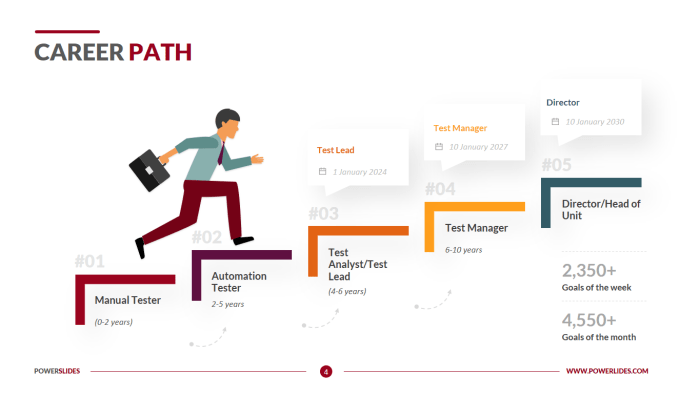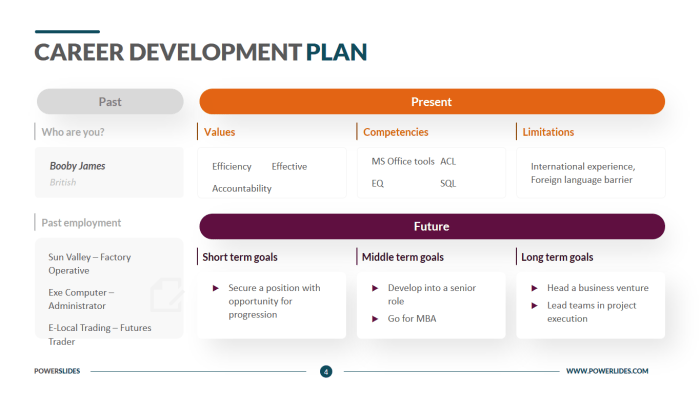Career Development Goals – a roadmap to success, a key to unlocking your full potential. Dive into the world of setting goals, overcoming challenges, and embracing growth.
Discover the power of aligning personal values with career aspirations and learn how mentorship and networking can shape your professional journey.
Importance of Career Development Goals

Setting clear career development goals is crucial for professional growth as it provides a roadmap for individuals to follow in order to advance in their careers. Without clear goals, individuals may lack direction and purpose in their career journey, leading to stagnation or lack of progress.
Impact on Career Trajectory
- Having well-defined career goals can positively impact one’s career trajectory by helping individuals focus on specific skills and experiences needed to reach their desired position.
- Clear goals can motivate individuals to seek out opportunities for growth, whether through additional training, networking, or seeking new challenges.
- Individuals with defined career goals tend to be more proactive in their career development, taking charge of their own path rather than waiting for opportunities to come their way.
Relationship with Job Satisfaction
- Setting and achieving career development goals can lead to increased job satisfaction as individuals feel a sense of accomplishment and progress in their careers.
- Having a clear direction in one’s career can also reduce feelings of uncertainty or doubt about the future, contributing to overall job satisfaction.
- Individuals who actively work towards their career goals are more likely to feel engaged and fulfilled in their work, leading to higher levels of job satisfaction and motivation.
Types of Career Development Goals
Career development goals can be categorized into different types based on the focus and timeline. Here are some key categories to consider:
Skill-Based Goals
Skill-based goals focus on acquiring or improving specific skills that are relevant to your career. These goals often involve taking courses, attending workshops, or gaining hands-on experience in a particular area. Examples of skill-based goals include:
- Enhancing proficiency in a programming language
- Improving communication and presentation skills
- Mastering project management techniques
Promotion Goals
Promotion goals are aimed at advancing to a higher position within a company or industry. These goals typically involve demonstrating leadership capabilities, exceeding performance expectations, and taking on additional responsibilities. Examples of promotion goals include:
- Securing a supervisory role within the next two years
- Leading a cross-functional team on a major project
- Achieving a management position within five years
Learning Goals
Learning goals focus on expanding knowledge and expertise in a particular field or industry. These goals often involve pursuing advanced degrees, certifications, or professional development opportunities. Examples of learning goals include:
- Obtaining a certification in digital marketing within six months
- Completing a master’s degree in business administration within three years
- Attending industry conferences to stay updated on the latest trends and best practices
It is essential to align your personal values with your career goals to ensure long-term satisfaction and fulfillment. By setting goals that resonate with your beliefs, interests, and aspirations, you are more likely to stay motivated and committed to achieving them. Remember to regularly reassess your goals and make adjustments as needed to stay on track towards a successful and fulfilling career.
Strategies for Setting Career Development Goals
Setting career development goals is crucial for professional growth and success. Here are some practical strategies to help you set SMART goals that will guide you towards your desired career path.
Setting SMART Career Goals
- Specific: Clearly define what you want to achieve in your career. Be detailed and focused on the outcome you desire.
- Measurable: Set goals that can be quantified or measured so you can track your progress and know when you have achieved them.
- Achievable: Make sure your goals are realistic and within reach based on your current skills, resources, and circumstances.
- Relevant: Align your career goals with your long-term aspirations and the direction you want your career to take.
- Time-bound: Set deadlines for your goals to create a sense of urgency and motivate yourself to work towards them consistently.
Revisiting and Adjusting Career Goals
- Periodically review your career goals to ensure they are still relevant and in line with your career progression.
- Adjust goals as needed based on changes in your circumstances, interests, or industry trends to stay on track towards success.
- Revisiting and adjusting your goals allows you to adapt to new opportunities and challenges that may arise in your career journey.
Mentorship and Networking for Goal Achievement
- Seek guidance from mentors who can provide valuable advice, insights, and support in defining and achieving your career development goals.
- Networking with professionals in your field can help you expand your opportunities, gain new perspectives, and connect with potential collaborators or employers.
- Mentorship and networking play a crucial role in career development by offering opportunities for learning, growth, and advancement.
Overcoming Challenges in Pursuing Career Development Goals

When striving to achieve career development goals, individuals often encounter various obstacles that can hinder their progress. It is essential to identify these common challenges and implement effective strategies to overcome setbacks and stay motivated on the path to success.
Identifying Common Obstacles, Career Development Goals
One common obstacle individuals face when pursuing their career goals is a lack of resources, whether that be time, money, or access to necessary tools and support. Additionally, fear of failure or rejection can hold people back from taking risks and seizing opportunities for growth.
Another challenge is the lack of clarity or direction in setting specific career goals, which can lead to confusion and indecision. External factors such as economic downturns or industry changes can also present unexpected challenges that require adaptability and resilience.
Strategies for Overcoming Setbacks
- Develop a support system: Surround yourself with mentors, peers, and resources that can provide guidance and encouragement during difficult times.
- Break goals into smaller steps: By breaking down larger goals into manageable tasks, you can track progress and stay motivated along the way.
- Learn from setbacks: Instead of viewing setbacks as failures, see them as opportunities for growth and learning. Reflect on what went wrong and how you can improve in the future.
Role of Resilience and Adaptability
Resilience and adaptability play a crucial role in navigating unexpected challenges in career development. Being able to bounce back from setbacks and quickly adjust to changing circumstances can help individuals stay on course towards achieving their goals.
By cultivating a mindset of resilience and embracing change as a natural part of the journey, individuals can overcome obstacles with a positive attitude and determination.